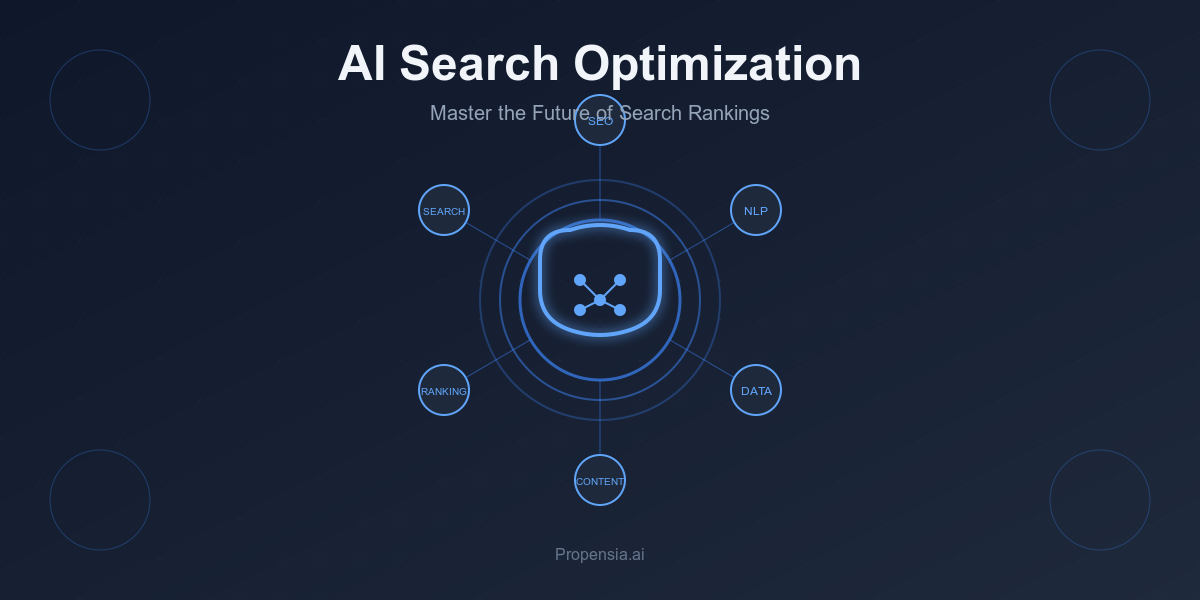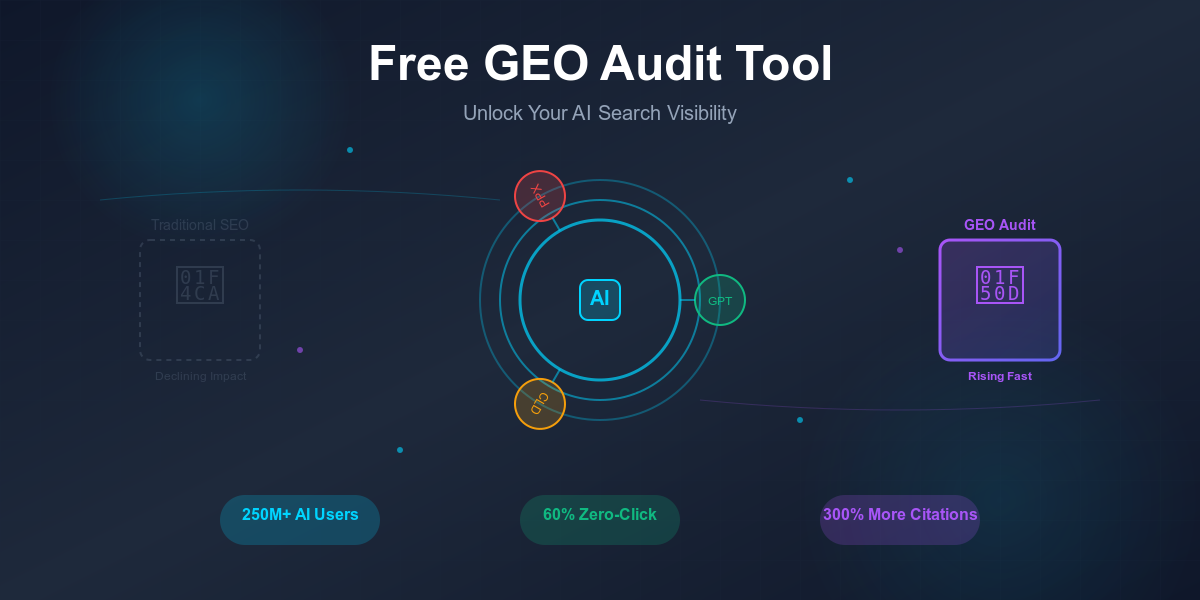The game has changed. While you've been obsessing over Google's algorithm updates and building backlinks, a seismic shift has occurred in how people find information online. AI-powered search engines like ChatGPT, Claude, and Perplexity are rapidly becoming the go-to sources for millions of users seeking instant, conversational answers.
Here's the reality check: If your content isn't optimized for AI search, you're already losing visibility to competitors who understand this new paradigm. But here's the good news – most businesses haven't caught on yet. This is your opportunity to get ahead.
What is AI Search Optimization?
AI Search Optimization (AISO) is the strategic practice of structuring and presenting your digital content to maximize visibility and citation within AI-powered search systems. Unlike traditional SEO, which focuses on ranking in search engine results pages, AISO ensures your content becomes the authoritative source that AI models reference when answering user queries.
Think of it this way: When someone asks ChatGPT about your industry, product, or service, will it mention your brand? Will it cite your expertise? Will it recommend your solutions? If not, you have an AI search problem.
The fundamental difference between SEO and AISO lies in intent and structure. SEO optimizes for algorithms that match keywords to queries. AISO optimizes for AI models that synthesize information to provide comprehensive answers. It's not just about being found – it's about being the trusted source AI systems turn to.
The New Search Landscape: Why AI Search Optimization Matters Now
Let me paint you a picture of what's happening right now. ChatGPT processes over 200 million queries weekly. Claude and Perplexity are growing exponentially. Microsoft's Copilot is integrated into billions of devices. Google's AI Overviews are reshaping traditional search results.
Your potential customers are no longer typing keywords into search boxes and clicking through pages of results. They're having conversations with AI assistants, asking complex questions, and expecting immediate, accurate answers. If your content isn't part of those answers, you don't exist in this new ecosystem.
The shift is particularly pronounced in B2B sectors, professional services, and technical industries where decision-makers value efficiency and comprehensive information. These users don't want to browse – they want answers. And AI is delivering those answers based on the content it can access and understand.
How to Improve AI Search Rankings: The Strategic Framework
Improving your AI search rankings isn't about gaming a system – it's about becoming genuinely valuable to AI models and their users. Here's the strategic framework that works:
1. Create Authoritative, Structured Content
AI models prioritize content that demonstrates expertise, authority, and trustworthiness. But unlike Google's E-A-T guidelines, AI systems can actually read and understand your content's depth. Surface-level content won't cut it.
Structure your content with clear hierarchies, comprehensive coverage of topics, and logical flow. Use headers that ask and answer questions. Include definitions, explanations, and context that help AI understand not just what you're saying, but why it matters.
2. Optimize for Natural Language Processing
AI models excel at understanding natural language, but they perform best with clear, unambiguous writing. Avoid jargon without explanation. Define industry terms. Write in active voice. Use concrete examples and specific data points.
Your content should read like an expert explaining a concept to an intelligent but uninformed audience. This isn't dumbing down – it's clarity of communication that both AI and humans appreciate.
3. Build Semantic Relationships
AI models understand context through semantic relationships. Don't just target keywords – build comprehensive topic clusters that cover every aspect of your subject matter. Link related concepts. Show how different pieces of information connect.
For example, if you're writing about AI Search Optimization, also cover related topics like conversational AI, natural language processing, content structuring, and search behavior changes. This semantic richness helps AI understand your content's relevance to various queries.
4. Prioritize Freshness and Accuracy
AI models are trained on data up to specific cutoff dates, but they prioritize recent, accurate information when available. Regular content updates, current statistics, and timely insights signal to AI systems that your content is reliable and relevant.
Implement a content refresh strategy. Update statistics quarterly. Add new developments as they occur. Remove outdated information. This ongoing maintenance keeps you relevant in AI search results.
How to Rank on ChatGPT: Tactical Implementation
Ranking on ChatGPT and similar AI platforms requires specific tactical approaches. Here's what actually works:
Technical Optimization
Ensure your content is technically accessible to AI crawlers. This means:
Clean, semantic HTML structure
Proper schema markup
Fast loading times
Mobile optimization
Clear URL structures
AI models often access content through web crawlers similar to search engines. Technical barriers that would hurt SEO will devastate your AI search visibility.
Content Depth and Comprehensiveness
ChatGPT and other AI models favor comprehensive resources over thin content. Aim for:
Minimum 1,500-word articles for complex topics
Multiple perspectives and viewpoints
Cited sources and references
Real-world examples and case studies
Step-by-step processes where applicable
Question-Answer Optimization
Structure content to directly answer common questions in your field. Use:
FAQ sections with detailed answers
How-to guides with clear steps
Comparison content that helps decision-making
Problem-solution frameworks
AI models excel at extracting answers from well-structured Q&A content.
Brand and Entity Optimization
Establish your brand as an entity AI recognizes:
Consistent brand mentions across content
Clear about/company pages
Author bios that establish expertise
Structured data markup for organizations
Press releases and news coverage
When AI understands who you are and what you represent, it's more likely to cite you as a source.
The Propensia.ai Approach to AI Search Optimization
At Propensia.ai, we've developed a systematic approach to AI Search Optimization that goes beyond traditional SEO tactics. We understand that ranking in AI search results requires a fundamental shift in how content is created, structured, and maintained.
Our methodology focuses on building authoritative content ecosystems that AI models naturally gravitate toward. We don't chase algorithms – we build resources that become indispensable to both AI systems and human users.
This involves deep competitive analysis to understand what AI currently cites in your industry, content gap identification to find opportunities your competitors miss, and strategic content development that positions your brand as the definitive source on key topics.
Measuring AI Search Optimization Success
Unlike traditional SEO, measuring AI search visibility requires new metrics and approaches:
Direct Testing: Regularly query AI platforms about your industry topics and track whether your brand appears in responses.
Citation Tracking: Monitor when and how AI models reference your content or brand.
Conversation Share: Track the percentage of AI responses in your industry that mention your brand versus competitors.
Semantic Coverage: Measure how comprehensively your content covers topic clusters relevant to your industry.
Engagement Metrics: Track user behavior from AI-referred traffic to understand quality and intent.
The Future of Search is Conversational
The transition from traditional search to AI-powered conversational interfaces isn't coming – it's here. Every day you delay implementing AI Search Optimization is a day your competitors gain ground in this new landscape.
The businesses that win in this new era won't be those with the most backlinks or the perfect keyword density. They'll be the ones AI systems trust to provide accurate, comprehensive, valuable information to users.
AI Search Optimization isn't just another marketing tactic – it's a fundamental shift in how businesses need to think about their digital presence. It requires commitment to quality, depth, and genuine value creation. But for those willing to make that commitment, the rewards are substantial.
Your content strategy needs to evolve. Your optimization approach needs to adapt. Most importantly, your mindset needs to shift from ranking in search results to becoming the trusted source AI turns to for answers.
The question isn't whether you should invest in AI Search Optimization. The question is whether you can afford not to. Because while you're reading this, your competitors might already be implementing these strategies, gradually becoming the default answers AI provides in your industry.
Take action now. Audit your current content. Identify gaps in your AI search visibility. Start building the authoritative, structured content that positions your brand for success in the AI-powered future of search.
Remember: In the world of AI search, it's not about gaming algorithms or finding shortcuts. It's about becoming genuinely valuable to both AI systems and the humans they serve. That's not just good marketing – it's good business.
Ready to dominate AI search results? Propensia.ai specializes in AI Search Optimization strategies that position your brand as the authoritative source in your industry. Contact us to learn how we can transform your digital presence for the AI-powered future of search.

